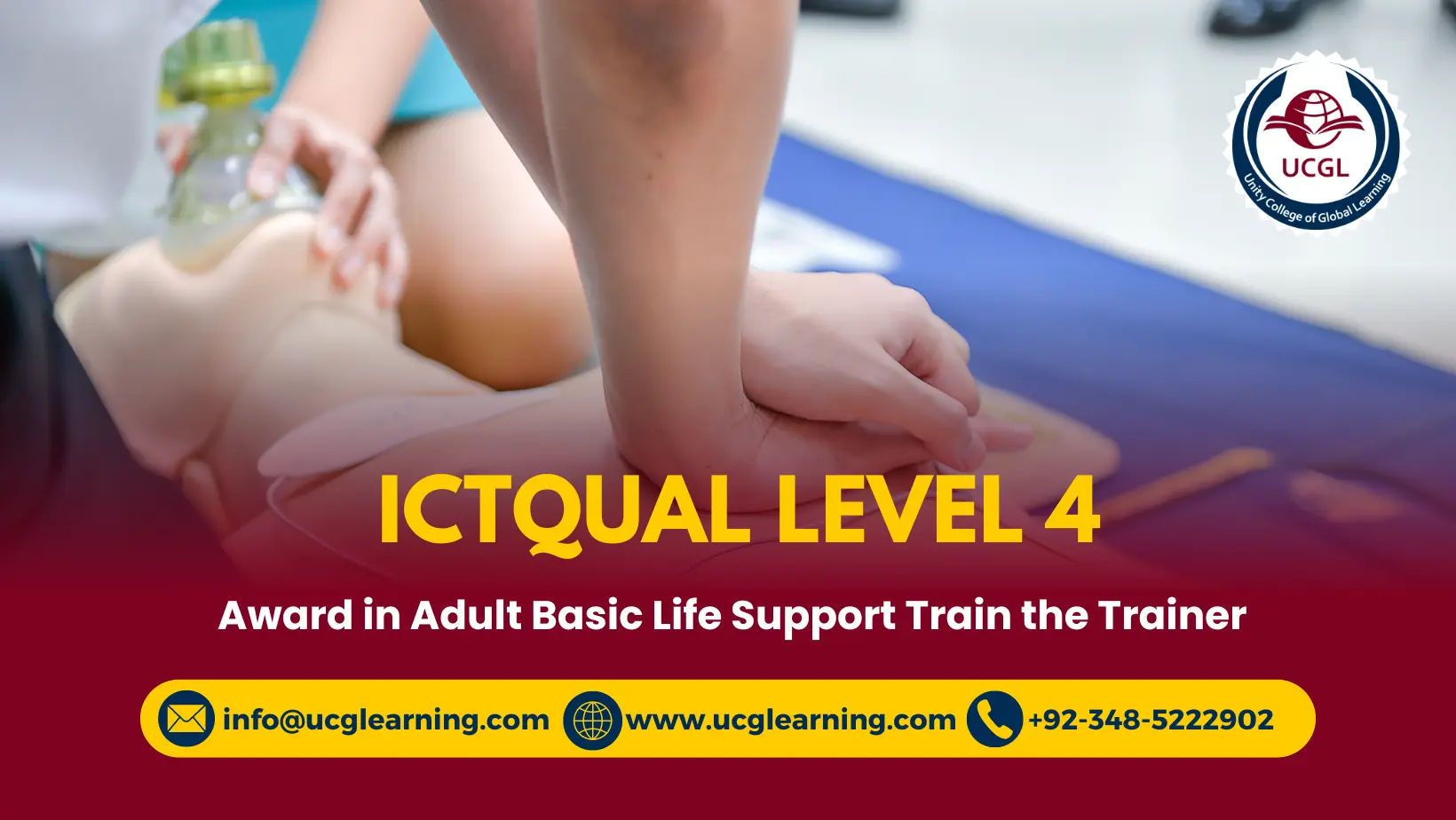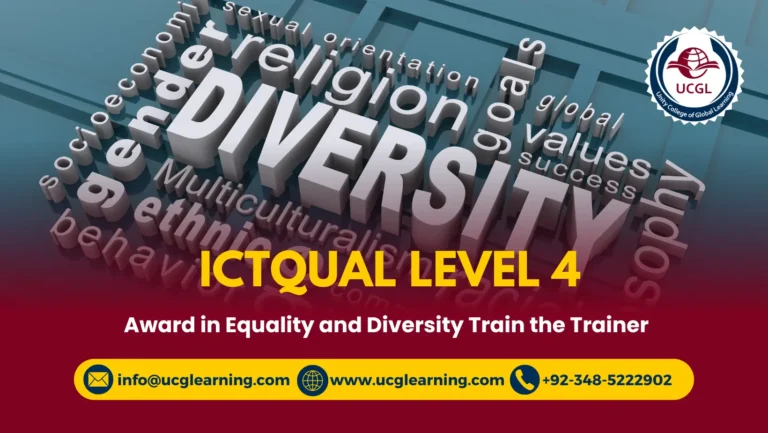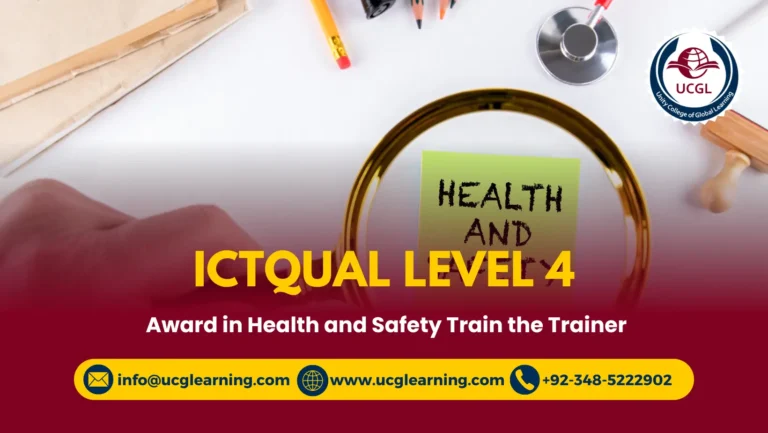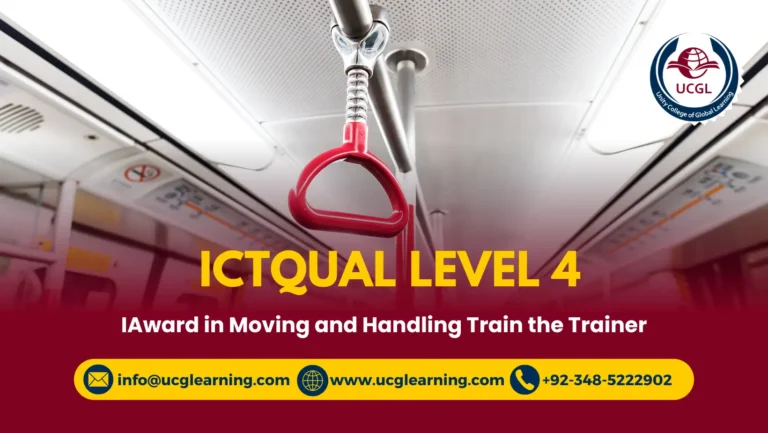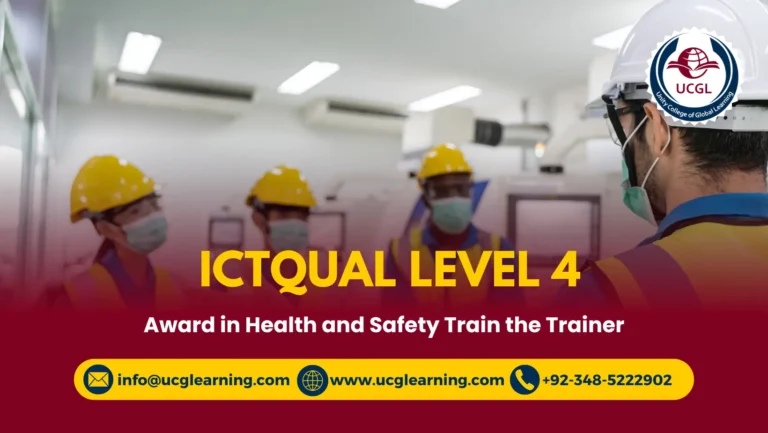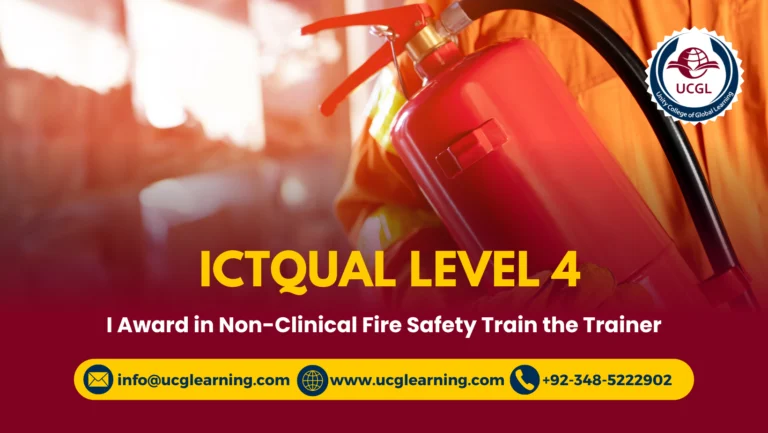ICTQual Level 4 Award in Adult Basic Life Support Train the Trainer
In today’s fast-paced world, the ability to respond effectively to life-threatening emergencies is an invaluable skill. The “Level 4 Award in Adult Basic Life Support Train the Trainer” course is designed for those who wish to not only master the fundamentals of adult basic life support but also impart this critical knowledge to others.
Course Introduction:
The Level 4 Award in Adult Basic Life Support Train the Trainer is designed to provide participants with the skills and knowledge necessary to deliver effective training in adult basic life support techniques. This comprehensive course covers a range of topics essential for handling emergency situations, including cardiopulmonary resuscitation (CPR), using automated external defibrillators (AEDs), and managing choking incidents in adults.
Course Benefits:
- Empowerment: Participants gain the confidence and competence to act swiftly and effectively in emergency situations, potentially saving lives.
- Teaching Skills: The course not only focuses on life-saving techniques but also hones teaching abilities, enabling participants to effectively convey critical information to others.
- Community Impact: By becoming certified trainers, participants contribute to building a community of individuals who are prepared to respond to emergencies, creating a safer environment for all.
Course Study Units:
The curriculum of the Level 4 Award in Adult Basic Life Support Train the Trainer is structured to cover essential aspects of adult basic life support training. Key study units include:
- Foundations of Adult Basic Life Support (BLS) Training
- BLS Techniques and Protocols
- Assessment and Recognition of Life-Threatening Emergencies
- Airway Management and Choking Relief
- Automated External Defibrillator (AED) Use
- Effective Teaching and Training Strategies
- Assessment and Feedback
- Training Program Development and Delivery
- Legal and Ethical Considerations
- Continuous Professional Development
Learning Outcomes:
- Foundations of Adult Basic Life Support (BLS) Training:
- Understand the fundamental principles and objectives of adult basic life support training.
- Identify the key components of effective BLS training programs.
- Explain the importance of prompt and appropriate intervention in life-threatening emergencies.
- BLS Techniques and Protocols:
- Demonstrate proficiency in performing basic life support techniques, including chest compressions and rescue breathing.
- Follow established protocols for initiating and maintaining basic life support measures.
- Identify variations in BLS techniques based on specific emergency scenarios and patient conditions.
- Assessment and Recognition of Life-Threatening Emergencies:
- Recognize signs and symptoms of life-threatening emergencies, such as cardiac arrest and respiratory distress.
- Conduct systematic assessments to determine the severity and nature of the emergency.
- Prioritize interventions based on the urgency of the situation and the patient’s condition.
- Airway Management and Choking Relief:
- Demonstrate proficiency in establishing and maintaining a clear airway in patients experiencing airway obstruction.
- Apply appropriate techniques for relieving choking in conscious and unconscious individuals.
- Identify potential complications and implement corrective measures during airway management procedures.
- Automated External Defibrillator (AED) Use:
- Operate an automated external defibrillator (AED) safely and effectively in accordance with manufacturer guidelines.
- Recognize scenarios where AED deployment is indicated and integrate its use into the overall management of cardiac arrest.
- Coordinate AED deployment with basic life support interventions and emergency medical services response.
- Effective Teaching and Training Strategies:
- Apply principles of adult learning theory to design engaging and interactive training sessions.
- Employ a variety of teaching methods and instructional aids to cater to diverse learning styles.
- Facilitate group discussions, role-playing exercises, and skills demonstrations to enhance participant comprehension and retention.
- Assessment and Feedback:
- Develop objective assessment criteria to evaluate participants’ mastery of BLS techniques and concepts.
- Provide constructive feedback to participants based on their performance during training sessions.
- Identify areas for improvement and offer targeted remedial interventions to enhance learning outcomes.
- Training Program Development and Delivery:
- Design comprehensive training programs that address the specific needs and objectives of target audiences.
- Organize training sessions effectively, including scheduling, venue selection, and resource allocation.
- Monitor and evaluate the effectiveness of training programs through participant feedback and performance assessments.
- Legal and Ethical Considerations:
- Understand legal and ethical obligations related to providing emergency medical care and training.
- Comply with relevant regulations and standards governing BLS training and practice.
- Maintain patient confidentiality and respect individual rights and preferences in accordance with ethical guidelines.
- Continuous Professional Development:
- Recognize the importance of lifelong learning and professional growth in maintaining competence as a BLS trainer.
- Engage in ongoing education and training opportunities to stay abreast of advances in BLS techniques, technology, and best practices.
- Pursue certifications, memberships, and other professional development activities to enhance credibility and expertise in the field of BLS training.
Who is This Course For?
The Level 4 Award in Adult Basic Life Support Train the Trainer is suitable for individuals who are passionate about making a difference in their communities and are committed to equipping others with life-saving skills. This course is ideal for:
- Healthcare professionals
- First aid trainers
- Emergency responders
- Community leaders
- Anyone interested in becoming certified in adult basic life support training
Future Progression for This Course:
Completion of the Level 4 Award in Adult Basic Life Support Train the Trainer opens doors to various avenues for career advancement and personal development. Graduates may choose to:
- Pursue further qualifications in related fields, such as advanced life support training or emergency medical services.
- Join organizations dedicated to emergency response and contribute their expertise as trainers or educators.
- Establish their own training consultancy or collaborate with existing institutions to deliver adult basic life support training programs.
- Serve as advocates for emergency preparedness and promote the importance of life-saving skills within their communities.
Level 4 Award in Adult Basic Life Support Train the Trainer is not just a course; it’s a catalyst for change. By equipping individuals with the knowledge and skills to respond effectively to emergencies, this course empowers them to become agents of positive transformation in their communities. Together, let’s take a proactive stance in saving lives and building a safer tomorrow.

